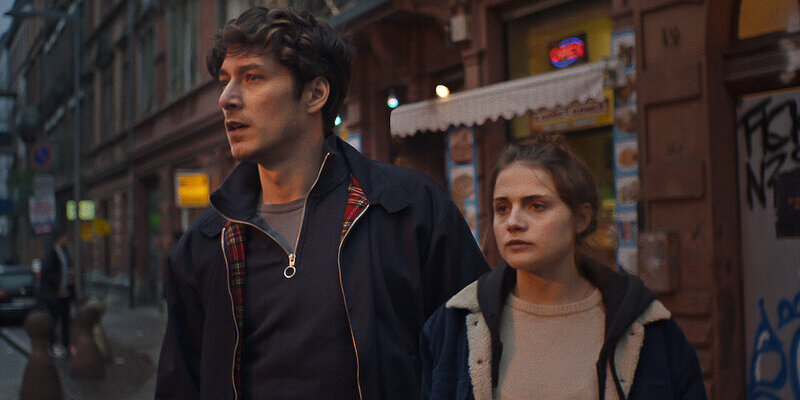
Review by
Eric Hillis
Directed by: Julia von Heinz
Starring: Mala Emde, Noah Saavedra, Tonio Schneider, Andreas Lust, Luisa-Céline Gaffron

Julia von Heinz's And Tomorrow the Entire World opens
with a passage from Germany's constitution which states that the country's
citizens have the right to fight using any means necessary if democracy is
threatened. Given Germany's history, you can see why it was originally
written in, but those who drew up the constitution couldn't have foreseen
the 21st century, when the slightest grievance causes citizens to compare
their government to the regime Nazi Germany. The phrase "Nazi" is flung
about so often now by those on both sides of the political fence that it's
in danger of becoming meaningless.
Of course, genuine Nazis are on the rise again, and worryingly, they seem
to be gaining traction in Germany of all places. 20-year-old Law student
Luisa (Mala Emde) wants to battle the emerging Fourth Reich and so
accepts her friend's offer of joining an anti-fascist commune. For most of
the commune members, fighting fascism equates to selling home-grown
produce at vegan markets, painting banners and shouting slogans. Under the
leadership of Lenor (Tonio Schneider), they deliberately avoid
violence, believing it would undermine their message.

Among the ranks however is Alfa (Noah Saavedra), who believes that
the only way forward is to take on the Nazis at their own game. When Luisa
steals a burner phone from a skinhead at a rally, Alfa and Lenor go
through its contents and uncover a conspiracy involving a notorious Nazi
who went underground a couple of years ago but who seems to be secretly
leading a new generation. This leads them to find a secret stash of
explosives equipment, which fuels Alfa's desire to escalate his campaign.
Driven by her attraction to Alfa, Luisa rejects the commune's pacifist
philosophy and joins Alfa in smashing up Nazis' cars and faces.
For a movie that tackles such a hot button issue,
And Tomorrow the Entire World is surprisingly lacking in
political depth. We know what Luisa and her buddies are fighting against,
but it's never made clear what they're fighting for. Luisa's motivations
are equally ambiguous. She doesn't seem to have any definable political
convictions of her own. Does she join the commune to strike back against
her upper middle class parents? Is she horny for Alfa? Or does she simply
enjoy the adrenaline rush of a good ruck?

The film's refusal to get off the fence makes it play a lot like a
centrist news report that blames "both sides" whenever such trouble kicks
off. If Luisa's goals and motivations were more clearly defined we might
find it easier to engage with her, but her ambiguity creates a distance
and we're left to simply watch as she's led down a troubling path.
So uninvested in the details of its politics is von Heinz's film that it
could be interchangeable with any generic story of someone getting sucked
in and seduced by a dangerous movement. It plays a lot like all those
British movies where some troubled young man finds a new lease of life
through football hooliganism. So paper thin are the Nazis and
anti-fascists that when they strike blows we might as well be watching
Millwall and West Ham fans having a rumble.

The only time the movie appears to express an opinion is through the
character of Dietmar (Andreas Lust), a middle-aged man who spent 20
years behind bars for his involvement in terrorism in the 1980s. Dietmar
becomes something of a paternal figure for Luisa, trying to dissuade her
from getting involved with Alfa's plans. What then is the film's message -
fascists should be ignored and fighting them is pointless? That's quite a
stance for a German movie to take.

And Tomorrow the Entire World is on
Netflix UK/ROI now.

